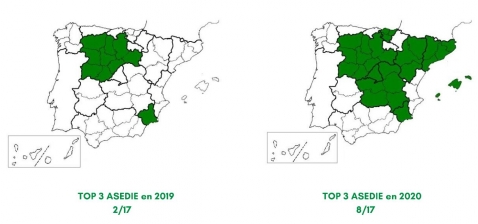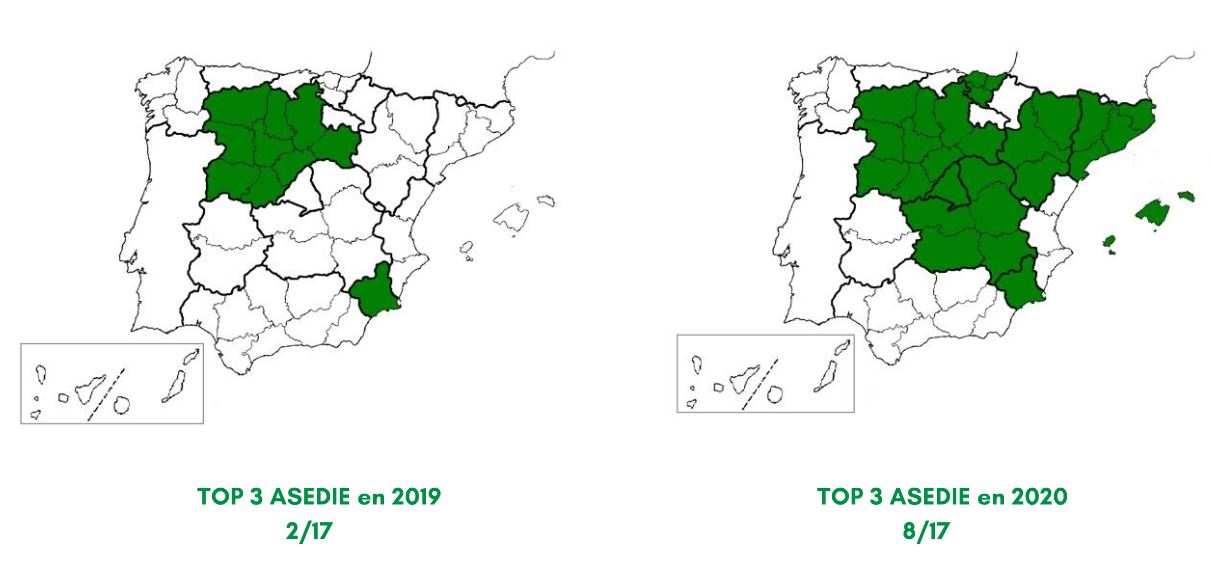ASEDIE is promoting the opening of three sets of harmonised data in all the Autonomous Communities
Fecha de la noticia: 03-07-2020

The Multisectorial Information Association (ASEDIE), which brings together the infomediary companies of our country, has, among its objectives, to promote the use, reuse and distribution of information, both public and private, creating value-added products. In this sense, it has launched an initiative to promote the complete opening of three datasets by all the Autonomous Communities (ACs), following unified criteria that facilitate their reuse.
Specifically, the idea is to open three databases, including the tax identification number of each of the entities. These databases are:
- Cooperatives
- Associations
- Foundations
These datasets have been called the "Top 3 ASEDIE 2019". This action was presented in last year's edition of the Infomediary Sector Report and the evolution of its result has been included in the latest edition of this year's report. It is worth noting that 764 companies participated in the 2020 edition, an increase of 10% over the previous edition. This increase in participation reflects the growth of the sector in Spain, both in the number of companies and employees working in this activity, and in its turnover, with an aggregate turnover of more than 2 billion euros.
Driving the opening of three new data sets
Since 2018, ASEDIE has been urging those responsible for the databases of cooperatives, associations and foundations in the 17 Autonomous Communities to make an effort to:
- Identify and open the 3 requested databases
- Unify download formats
- Unify the forms to be filled in when registering
These actions mean going one step further in the commitment to information quality, facilitating its standardization. According to ASEDIE studies, 60% of infomediary companies highlight that the main barrier to the reuse of information is that it is only available in some Autonomous Communities or Town Councils. With actions such as the one developed by ASEDIE, it would be possible to homogenize the available information helping to break down this barrier.
2019: a not very encouraging situation, but with a great margin for improvement and projection
During 2019, ASEDIE only found this type of data open in very localized areas of Spain, such as the two mesetas, the coastal areas and the two archipelagos (Balearic and Canary Islands). The overall picture reflected that, in many Communities, most of these three databases remained closed or open without CIF.
| Type of document | Title | Content |
|---|---|---|
| Opened in 9 of 17 CCAA. | Open in 4 of 17 CCAA. | Abiertas en 7 de 17 CC.AA. |
| Aragon, Castile and Leon, Castile-La Mancha, Catalonia, Galicia, Madrid, Murcia, Basque Country and La Rioja. | Andalusia, Castile and Leon, Murcia and La Rioja |
Aragon, Castile-La Mancha, Castile and Leon, Catalonia, Madrid, Murcia and Basque Country. |
2020: great improvements achieved in the sector in recent months.
In this case, the Asedie 2020 Report shows that the situation has improved considerably compared to the previous year, as new areas can be seen where the Autonomous Communities have opened these three databases.

At the date of the presentation of the Report, there were already eight Communities with open databases of Associations, Cooperatives and Foundations. In Navarra, two databases that was closed the previous year were opened in 2020, although without a tax identification number. The Basque Country has two completely open databases and one in the absence of a tax identification number. In Catalonia, these three databases are now completely open with a tax identification number, while in Aragon, the database for cooperatives has been opened in the absence of a tax identification number.
The autonomous community that has had the greatest performance over the last year has been the Balearic Islands, as it has shifted from having the three closed to opening them completely in just one year. The community of Castilla y León is another of those that have all three databases completely open.
The situation will also continue to improve over the coming months, as it is estimated, according to the report, that 88% of the Autonomous Communities are considering action plans to open or improve the publicity of registers of this type.
Next steps: continue to push for the opening of homogenized data
Once ASEDIE has achieved the necessary momentum and after the good reception by the Autonomous Regions, on 18 March the "Top 3 Asedie 2020" was presented, so that this work of opening and homogenization does not stop and the Autonomous Regions that already have the first Top 3 open, will continue with their work:
- Commercial establishments
- Industrial parks
- SAT records
In short, thanks to these initiatives, public-private collaboration will be boosted by making it easier for companies to reuse public information, which will have a great impact on the generation of new business and wealth.











